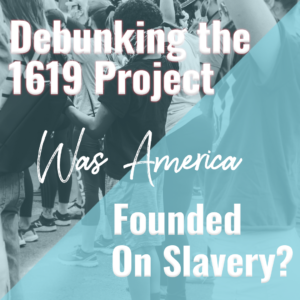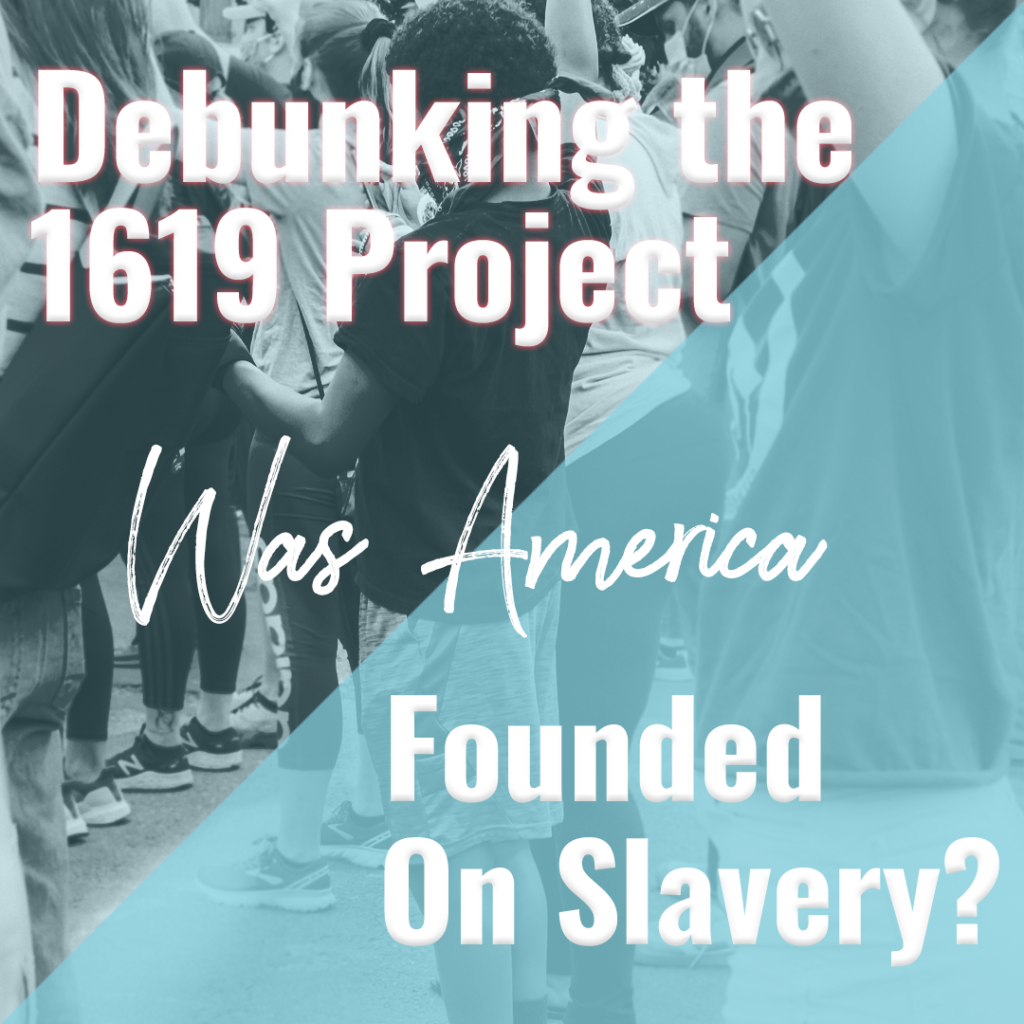A new movement has reared its head on the landscape of education and history. One that seeks to change the way people (especially school-age children) understand the history of black America. Truth, cultural roots, history, and education are all at war over this movement: The 1619 Project.
The 1619 Project has been a source of controversy since its publication in August 2019. After multiple historians and scholars submitted critiques and requests for edits, the New York Times quietly altered some of its most controversial content without apology for their mistakes but left the majority of the project uncorrected.
As American schools begin to adopt this new curriculum that teaches a new version of history, will America learn what this revisionist history is and take a stand against it?
Will Americans become patriots again as they reclaim a country founded not on systemic racism but on the tenets of freedom?
A Brief Overview Of The Project
The 1619 Project gives a broad overview of the history of black Americans. It includes 18 essays of poetry and stories, a photo essay, a podcast with five episodes, and additional material explaining why America was founded in racism.
The project’s main idea is clear. “Out of slavery — and the anti-black racism it required — grew nearly everything that has truly made America exceptional.”
In other words, America’s entire history revolves around the war for equality.
Nikole Hannah-Jones penned the main essay for the project in which she makes the case that “our democracy’s founding ideals were false when they were written, [and] black Americans have fought to make them true.”
Her reasoning behind this is anchored in the fact that 1619 marks the year when the first slaves set foot on American soil. In contrast, 1776 is the year when Thomas Jefferson penned the words “all men are created equal.” The problem: Thomas Jefferson owned slaves.
In Hannah-Jones’ essay, she writes that the Declaration of Independence’s claim of equality did not (and does not) apply to black men and women.
She puts it bluntly. “The United States is a nation founded on both an ideal and a lie.”
The other essays in the 1619 project reinforce Hannah-Jones’ statements that America is founded in racism, including an essay making the case that capitalism is brutal, another essay blaming Atlanta traffic jams on segregation, and yet another blaming America’s sugary diet on racism.

Public Response to the 1619 Project
The 1619 Project has sparked hot debates and critiques all across America. Many scholars and historians from both sides of the political spectrum have protested the project’s historical claims of America’s systemic racism.
In response, the creators of The 1619 Project admit themselves that they are not historians but are instead “journalists, trained to look at current events and situations and ask the question: Why is this the way it is?” They say the Project “was intended to address the marginalization of African-American history in the telling of our national story and examine the legacy of slavery in contemporary American life.”
In other words, the Project puts slavery as the focus of America’s history, not freedom.
The National Association of Scholars openly critiqued Hannah-Jones’ Pulitzer Prize-winning essay, calling it “profoundly flawed” and “disfigured by unfounded conjectures and patently false assertions.”
Even after heavy criticism succeeded in causing the Times to make changes to The 1619 Project, Hannah-Jones proceeded to deny the claims she originally made in her essay. For example, she tweeted that 1619 was the original founding of America but later, on a CNN interview, she denied that she ever wrote such a statement.
As Phillip Magness writes on Quillette, edits and changes to the 1619 Project are not publicized or apologized for. They are simply sent down the “project’s memory hole.”
A chilling reminder of George Orwell’s 1984.
The Goal of The 1619 Project
Hannah-Jones makes the goal of The 1619 Project clear. She wants “white people to give up whiteness,” and she demands reparations for the wrongs slaves faced.
Indeed, slavery was a horrific evil in America. The terrible deeds of the past must not be forgotten, lest they be repeated, and those who committed those deeds will be judged in eternity. However, the problems of the modern world cannot be completely blamed on the sins of the past.
Bret Stephens responded to the project in his Times article saying monocausality oversimplifies a complex world. White supremacy, oppression, or even economic issues cannot take full blame for every problem a country faces.
To make his point crystal clear, he adds, “The job of journalism is to take account of that complexity, not simplify it out of existence through the adoption of some ideological orthodoxy.”
It is not right for the descendants of wrongdoers to be forced to pay for the sins of their forefathers.
Imagine your grandfather receives a Pulitzer Prize for some great academic work he wrote. Should you receive praise for his prize or be given opportunities to go on a speaking tour because he won the Pulitzer Prize? Absolutely not. He deserves the praise, not you.
The same goes for the wrongdoings of our ancestors. We should take a lesson from them and never repeat the atrocities they committed, but we should not be punished for what they did wrong.
RELATED: Taking Responsibility For Problems And Fixing Them
So… Is America Founded On A Lie?
Hannah-Jones would have the public think America was founded on a lie. And if Thomas Jefferson preached equality only for whites, her claims may be justified. Jefferson clearly wrote that all men are equal, but he also owned slaves. How is this right?
It is important to note that Thomas Jefferson was not the only mastermind behind the Declaration of Independence. He was a member of the Continental Congress and served as a sort of stenographer as opposed to the sole author of the document.
Therefore, the words he wrote cannot be ignored just because his morals didn’t live up to the words he and the Continental Congress agreed on. There were other men on the committee who also bear responsibility for America’s timeless, founding documents.
The Founders Borrowed The Ideas Of Great Thinkers
Moreover, as Adam Seagrave writes, the American Founding Fathers were not the original inventors of the ideas of equality that they penned in the founding documents. They borrowed them from John Locke, English Protestants, and medieval ideology which formed the foundation of the Republic and equality.
Slavery was a hotly debated topic for members of the Continental Congress and continued to be an explosive subject as America matured. It is true that slavery was not abolished right away at America’s founding, but less than 100 years after its founding, America fought a bloody Civil War to free its slaves and has continued to fight for equality ever since.
Why America Fought the Revolutionary War (Hint: It Wasn’t to Keep Slaves)
America fought the Revolutionary War to gain freedom from Great Britain (not to keep its slaves, as The 1619 Project suggests). America wanted liberty from England for a number of reasons, including Britain’s taxation without representation and the Stamp Act.
Abraham Lincoln put it this way in his 1857 Speech on the Dred Scott decision. “The assertion that ‘all men are created equal’ was of no practical use in effecting our separation from Great Britain; and it was placed in the Declaration, nor for that, but for future use.”
Adam Seagrave makes the case that The 1619 Project’s goal is not to ruin the Founding Fathers’ reputations. The project actually tries to negate the great ideas these men propagated. These ideas are justice, liberty, and independence.
America set forth principles and a system of justice that would one day end slavery in America.
The 1619 Project claims slavery made America rich, but the truth is that slavery robbed America of her fathers and sons when 360,000 Union soldiers gave their lives to free the slaves. Moreover, since the Civil War ended, America’s GDP has increased 12,000%.
It took time, but America abolished her worst evil by standing on the principles set forth in the Declaration of Independence. America truly believes all people are created equal and that all people should have equal rights to freedom.
If America did not staunchly stand behind equality, slavery would not have been abolished so quickly.
Conclusion
America is guilty of slavery and bloodshed, it is true. But America has also attracted millions of immigrants to live in a free land. America has fought against slavery both on her own land and in other countries overseas.
And even today, as The 1619 Project gains traction in schools and corporations, it fills white Americans with sorrow for wrongs they never committed. When confronted with a claim that they are racist, most Americans are quick to fall to their knees and beg forgiveness from their black peers.
If only they knew the truth: that America was not founded in bondage.
Why would America claim their founding year as 1619, the date when slaves first landed on American turf, rather than 1776, the year the Founding Fathers penned words that established the groundwork for the emancipation of America’s slaves?
Why make children ashamed of their country when it is really something to be loved and cherished?
It is time to become American patriots again. Whether black or white, it is time each American stood up and became responsible for his or her daily actions, rather than victimizing oneself and blaming every problem on sins of the past. It’s a simple cop-out with grave consequences.
It is time to take back America’s true history and stop the wave that is overtaking American schools with revisionist history.
Americans of all skin colors and genealogies must stand proudly together and resist surrendering themselves to a mindset that chains them to oppression and racism which they are told they cannot escape.
As Adam Segrave writes, “The United States of America was indeed started in slavery, but it was founded in freedom.” These words are a fitting call to make Americans proud to claim their country as the great nation it was born to be.

4 comments